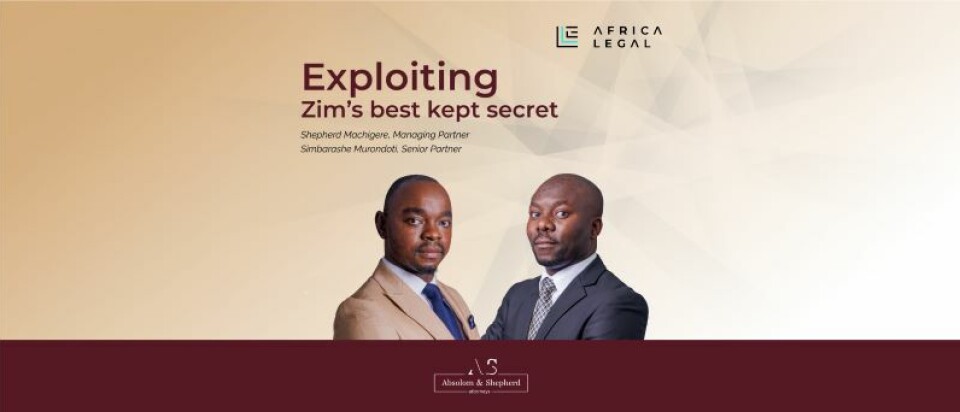Copyright : Re-publication of this article is authorised only in the following circumstances; the writer and Africa Legal are both recognised as the author and the website address www.africa-legal.com and original article link are back linked. Re-publication without both must be preauthorised by contacting editor@africa-legal.com
Exploiting Zim’s best kept secret

With Africa’s largest lithium deposits and vast, diversified mineral resources, mining in Zimbabwe could soon be worth $12 billion annually. Shepherd Machigere and Simbarashe Absolom Murondoti discussed the prospects with Craig Sisterson.
While Zimbabwe’s mineral resources are vast and diverse in nature and have huge potential, care needs to be taken to ensure sustainable long-term success for the mining industry and the nation, say Shepherd Machigere and Simbarashe Absolom Murondoti.
“Our mining industry is very vibrant and promising; I’d term it Zimbabwe’s best kept secret because of the potential for the economy,” commented Murondoti, Senior Partner at Harare-based Absolom & Shepherd Attorneys. “Zimbabwe is naturally endowed with vast mineral resources across more than 40 mineral types, ranging from platinum group metals to gold, diamonds, chrome and lithium. We believe the industry has huge potential.”
Murondoti notes that in 2021, Zimbabwean gold exports alone amounted to US$1.7 billion (up from $1.2 billion in 2020), and government data says it’s “highly possible” for the sector to soon generate US$12 billion annually, “conditional upon implementation of key reforms”.
Through their firm’s thought leadership efforts, Murondoti and Machigere predicted the “lithium rush” before it sparked the huge recent transactions in Zimbabwe as global demand for solar panels and batteries for electric vehicles, laptops and mobile phones skyrocketed.
Zimbabwe has the largest lithium reserves in Africa, and last month, Prospect Lithium Zimbabwe, part of Chinese company Zhejiang Huayou Cobalt, opened a $300 million lithium processing plant outside Harare, after acquiring the Arcadia mine for $422 million last year. Sinomine also recently announced the completion of its own $300 million plant after acquiring Bikita Minerals for $180 million, and Chengxin Lithium has commissioned a lithium concentrator.
Machigere says it’s vital that multinational companies consult with local experts prior to investing in Zimbabwe, given the unique or changing policies and regulatory frameworks.
“Our regulatory landscape can be volatile, with a lot of policy shifts and inconsistencies, but it's something that one can navigate – with a good lawyer and advisor,” noted Machigere, a finance and exchange control expert who’s a qualified banker as well as the firm’s managing partner. “It’s also important for any potential investor to look at currency issues in Zimbabwe. The best way is to be proactive before one puts their foot on the ground, and invest with foreknowledge of exchange control, legal terrain and the requisite advice that ensures you obtain relevant approvals that can guarantee your investment is safe.”
The new lithium processing plants were developed because of a ban on raw lithium ore exports, which moved from temporary policy to law in December. “This will have long term gains for Zimbabwe as a nation,” said Murondoti, “but also short-term ramifications in that it may put off some investors. It will hopefully result in a major industry revamp for the nation.”
Other potential risks Machigere highlighted include a “use it or lose it” policy where long-time mining licences can be lost if no progress towards operations and production is reported. “Over 100 claims have been repossessed under that policy,” he said. “But with good legal advice, one can easily navigate that terrain. You need to constantly keep mine authorities informed about what your plans are, and what stage you’re in as it relates to the project.”
To join Africa Legal's mailing list please click here
